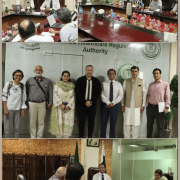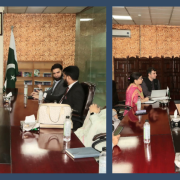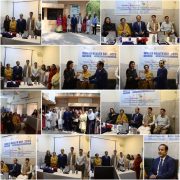World Health Day 2025: Health Beginnings, Hopeful Future
Focus on Maternal and Child Health
Islamabad, April 7, 2025 – The Islamabad Healthcare Regulatory Authority (IHRA) marked World Health Day 2025 with the theme, “Health Beginnings, Hopeful Future,” focusing on the importance of maternal and child health. The event, held in collaboration with the Islamabad District Health Office, was aimed at raising awareness about maternal and child health, emphasizing the significance of proper care, nutrition, and precautionary measures during pregnancy.
The event kicked off with an insightful opening address by Dr. Syeda Rashida Batool, District Health Officer of Islamabad. In her remarks, Dr. Batool highlighted the critical role of proper maternal care, underlining the importance of prenatal care and the various precautions necessary during pregnancy to ensure both mother and child’s health.
The second phase of the event saw a comprehensive workshop conducted by Dr. Ismat Rubab, a key member of the IHRA team. Dr. Rubab provided extensive guidance to healthcare workers, focusing on how to best care for pregnant women and educate them on maintaining health during pregnancy. She also emphasized the importance of vaccinations for both mothers and newborns, stressing that these preventative measures are key to securing a healthier future for the next generation.
In the third phase, the CEO of IHRA delivered his remarks on the vital role of maternal and child health. He spoke passionately about the importance of proper nutrition for mothers and children both during and after pregnancy, stressing that a healthy mother lays the foundation for a healthy child, which in turn contributes to the prosperity of a healthy nation. The CEO also expressed his gratitude towards healthcare workers who are at the forefront, spreading vital healthcare messages door to door and guiding communities in the crucial areas of maternal and child health.
The event concluded with a speech from Dr. Soofia Younas, Director General of the Population Department, Ministry of NHSR&C. As a policymaker, Dr. Younas stressed the need for continued focus on maternal and child health at the policy level, emphasizing that the efforts of healthcare workers are essential in implementing these policies on the ground. She commended the healthcare workers for their tireless work and dedication in ensuring the well-being of mothers and children across Islamabad.
The day ended with a visit by the CEO of IHRA to the District Health Office, where he engaged in meaningful discussions with healthcare workers about improving maternal and child health services in the region.
World Health Day 2025 served as a timely reminder of the importance of investing in the health of mothers and children to secure a healthier future for all. The event highlighted the collective responsibility of healthcare workers, policymakers, and communities to work together towards the goal of a healthier nation.





